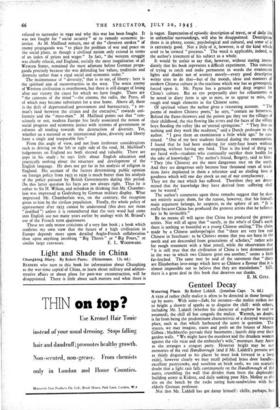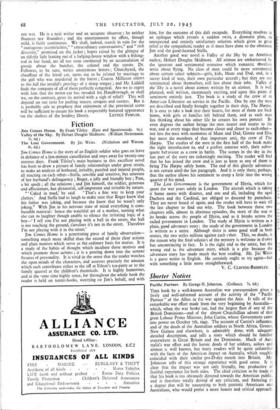Genteel Decay
Watering Place. By Robert LiddelL (Jonathan Cape. 7s. 6d.)
A VEIN of rather chilly malice is often to be detected in those brought up by aunts. With some—Saki, for instance—the malice strikes but so bright a shower of sparks as to disguise the chill: with others, including Mr. Liddell (whether his character of nephew be real or assumed), the chill all but congeals the malice. Warmth, no doubt, is far from being the predominant characteristic of a decayed watering place, such as that which harboured the aunts in question. The stucco, we may imagine, stains and peels on the houses of Mount Gilboa ; blackbeetles pervade their basements ; laurels drip over their garden walls. " We might have the murderer and the drunken woman against the vile vicar and the embezzler's wife," murmurs Aunt Anne as she arranges a croquet party. However bright may be our memories of the real Handborough (and if Mr. Liddell's persons arc as thinly disguised as his places he must look forward to a long exile), however clearly we may recall polished brass door handles, excellent pastrycooks, and sunshine on brick roofs, we can scarcely doubt that a light rain falls continuously on the Handborough of the aunts, crumbling the wall that divides them from the deplorable building estate at Kidron, and daily soaking poor Mrs. Molloy as she sits on the bench by the rocks eating ham-sandwiches with her elderly German professor.
Not that Mr. Liddell has got damp himself : chilly, perhaps, but
not wet. He is a neat writer and an accurate observer ; he neither flounces nor flounders ; and the entertainment he offers, though mild, is fairly continuous. We shall, indeed, search in vain for the " outrageous eccentricities," " extraordinary conversations," and " rich diversity," promised on the jacket ; hopes raised by the glimpse of an elderly lady leaning out of a lodging-house window with a fishing- rod in her hand, are all too soon smothered by an accumulation of gossip about the butcher, the colonel and the curate. Dr. Fellowes, to be sure, writes anonymous letters ; Churchyard, the chauffeur of the hired car, turns out to be related by marriage to the girl who was murdered in the forest ; Cousin Millicent enjoys to the full the invalid's privilege of a sharp tongue ; and Mr. Liddell finds the company of all of them perfectly congenial. Are we to regret with him that the motor-car has invaded his Hand borough, or shall we, on the contrary, greet its arrival with a sigh of relief? This will depend on our taste for peeling stucco, croquet and curates. But it is probably safe to prophesy that enjoyment of the provincial scene will be sufficient to ensure his book a respectably battered appearance 'on the shelves of the lendin3 library. LETTICE FOWLER..



























 Previous page
Previous page